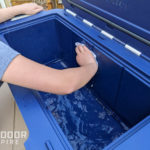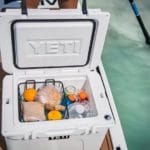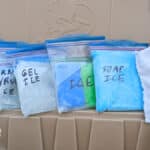Your cooler is probably your trusty sidekick for hauling food to the mountains or bringing home all your fish after a successful day on the lake. Cleanliness is essential when you use it for keeping food fresh.
Indeed, a cooler is one of the essential pieces of hunting, fishing, and camping gear, but you don’t want the stench of your last bounty to linger and leave its mark on your fresh meat. You also don’t want your cooler to become a source of offensive odor when you bring it home.
You can keep your cooler fresh by regularly cleaning it with baking soda, soap, and water. Dry it thoroughly, then store it in a cool, dry place indoors. Place a bag of desiccant inside to prevent mold or odor buildup. If stored in a garage, keep the cooler off the ground and out of direct sunlight.
If you’re wondering how to store coolers, you should check the instructions from the manufacturer and adhere to their guidelines. Both cleaning and storing your cooler properly are essential steps to extending its lifespan and preserving its condition.
Many high-end coolers — including models from brands such as Yeti, Orca, and RTIC — cost several hundred dollars. Needless to say, protecting your investment is essential.
If you don’t know how to store a Yeti cooler, you may find yourself dealing with mold, stench, and other unsavory problems. Learn how to store an ice chest, combat these problems, and ensure your cooler serves you well for years to come.
Proper Cooler Storage is Essential
When you’re not hauling your cooler with your bounty in tow, you need to know how to store coolers to preserve their condition.
Neglecting to store your cooler correctly can result in a permanent stench, mold growth, discoloration, and a shortened lifespan.
Rotomolded coolers, such as a Yeti, are built to last a lifetime. Of course, how long it lasts is ultimately determined by how you treat it.
A standard plastic cooler that’s cleaned regularly and well maintained will likely last longer than a rotomolded cooler that’s neglected and rarely cleaned.
If you’re wondering how to store your ice chest in a way that prevents damage, consider the following tips for guidance.
Where Should I Store My Cooler When Not in Use?
Many people wonder how to store coolers when they aren’t being used, and there’s no single answer to this question. You should first consult any literature that accompanied the cooler, and if you don’t see any answers, you should find a cool spot out of direct sunlight and safe from moisture.
Generally, though, how to store coolers is more important than where you store coolers. A cooler that’s thoroughly cleaned and kept in a small closet will retain its condition better than a cooler that’s neglected and kept in the garage. You should avoid storing it in places such as the following that are susceptible to overheating:
- Trunk of a car
- Uninsulated garage
- Outdoors
- Attic
Most of these spots are not climate controlled, so they may get extremely hot in the summer or cold in the winter, which can damage your cooler. Rather than store it in any of these spots, you should look for an indoor space that’s safe, dry, and at a moderate temperature. Perhaps you have space in your basement?
How to Store Coolers in a Garage

- Store in an area away from any potential hazards
- Keep away from windows that may cause sunlight exposure
- Put on a shelf if the ground might attract moisture
These tips can help you safely store your cooler in a garage, but it’s important to clean it thoroughly before storing it anywhere.
How to Store Your Ice Chest So It Doesn’t Smell
There’s nothing worse than a stinky cooler. After storing raw meat and fish for days, though, it might seem like an inevitability. Contrary to this belief, you don’t have to accept a cooler filled with foul odors. You can combat these smells and keep your cooler as fresh as ever by simply maintaining consistent cleaning practices.
You should first remove any smelly substances from the cooler as soon as possible and transfer them to a freezer. The longer you have raw fish and meat hanging out in your cooler, the more likely you’ll be dealing with a stinky problem.
Related: How To Properly Clean a Cooler
Once the cooler is empty, you should open it up and clean it thoroughly using a mixture of the following agents:
- 1 Tbsp baking soda
- 2 Tbsp dish soap
- 2 cups warm water
- 1 tsp rubbing alcohol
You can use this solution to clean the inside of your cooler and sanitize any bacteria that may remain. After doing so, you should leave it outside for a few hours to let any lingering stench naturally air out. After you’ve thoroughly cleaned your cooler, a desiccant can minimize moisture and absorb any odor that may still be present.
How to Keep Your Cooler From Molding
The smell isn’t the only concern you may have when caring for your cooler. You’re probably also concerned about how to store coolers so that they won’t grow any mold.
Even the high-end rotomolded coolers from brands such as Yeti, Igloo, RTIC, and Orca are susceptible to mold. Mold can grow in nearly any place where moisture is left to accumulate.
Minimize the condensation in your cooler and rinse out any grime that might be left behind. It’s best to do this as soon as possible after you’ve removed the contents of your cooler. Leaving the gunk to sit will increase the chances of mold, stench, and stains.
After you’ve cleaned out the cooler, you should leave it to air dry and wipe it down with a microfiber cloth to ensure no lingering moisture remains.
If you plan on leaving your cooler in storage for a while, check on it periodically to ensure no moisture has accumulated. Even if you believe it is in a dry area, moisture can creep in and cause mold to proliferate.
Leaving a desiccant inside your cooler during storage is a great way to prevent mold buildup.
How Climate Can Affect Your Cooler
Did you know that climate can also have a big impact on your cooler? Indeed, different environments play a big part in the condition and keeping of your cooler.
You should know how to store coolers in high humidity environments, for example, if you’re planning on traveling to the South in the summer. Humidity can increase the risk of mold growth, and it may necessitate a new cleaning routine.
Take note that extreme cold weather may make your cooler susceptible to cracking. Plastic tends to become brittle when exposed to cold temperatures for an extended period. Rotomolded coolers are far less likely to crack than a traditional plastic cooler is, but that doesn’t mean it’s impossible.
A rotomolded cooler may crack in cold weather or develop indentations. To avoid all of these possibilities, you should keep your cooler in an area where it’s protected from extreme weather — both hot and cold.
Major fluctuations in temperature can exert stress on your cooler and cause it to expand and contract, further increasing the likelihood of damage.
Insulated, climate-controlled areas of the house are ideal.
Keeping Your Cooler Safe
If you want to extend the lifespan of your cooler and ensure that it stays in great shape, you need to think about smells, mold and climate-related damage.
Protecting your cooler against these hazards might seem annoying, but it’s worth your time when you’re protecting such an expensive piece of outdoor gear.
Store coolers in a way that keeps them free from moisture, sunlight, and extreme hot and cold temperatures. This includes preparing a cooler for storage by cleaning it thoroughly and keeping it in a cool and dry spot.
Putting these tips into practice will help you get your money’s worth out of your cooler and ensure that it’s ready for use the next time you’re going on a hunt or a camping trip.





